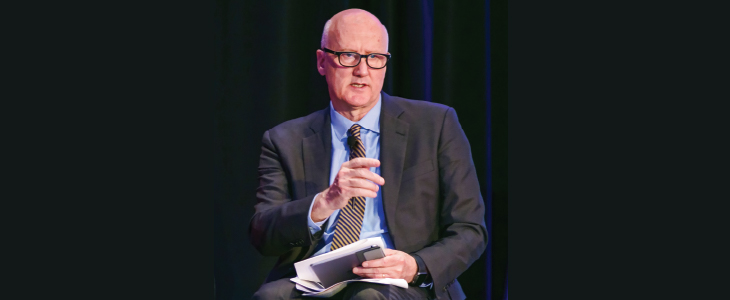
Human trafficking, a timeless example of the cruelty humans can inflict on one another, is receiving attention anew, adding new opponents along the way who are bringing innovative approaches to fight trafficking.
In conjunction with law enforcement and nonprofits (NPOs), ACAMS members and staffers have been a part of this fight and I am privileged in my role at ACAMS to witness how this fight continues to evolve, not least, in how we think about its victims.
Stories about women who are sexually trafficked too often sensationalize their victimization, according to Catie Hart, who works with AnnieCannons, an NPO dedicated to teaching software engineering skills that create a career path for trafficking victims.
“Anyone can be brainwashed,” Catie Hart says at the outset of a fundraiser for the organization at a loft in Willamsburg, Brooklyn.
Hart wants the young and well-educated crowd, many of them software engineers attending at the invitation of event sponsor Enigma Technologies, to know that the victims of trafficking are not that different from them.
At the event, Hart shares the story of an 18-year-old woman who leaves Colorado for San Francisco where she meets a man who wines, dines and lavishes her with gifts. She imagines marriage even as he challenges her to prove she is not merely a gold digger but willing to help support them both, eventually encouraging her to work in a strip club that also operates as a brothel.
“I was in love,” Hart says, explaining her fall into sex work.
In retrospect, she knows that the 10-month courtship by her trafficker was all part of the plan to break her. His curiosity about her, particularly his desire to know anything she was ashamed of, was just one way he was able to enslave her for seven years. Death threats were another.
If seven years seems like a long time, Jessica Hubley, co-founder of AnnieCannons, says it’s typical, given the high recidivism rate among the victims of sex trafficking she had encountered in the Bay Area.
“[Our students] report being in and out of shelters three to seven times because rescue and the shelter didn’t fix the underlying problem…lack of economic opportunity,” she explains in an email.
Two things helped Hart get free and enabled her to go to college, ultimately obtaining a degree from the University of California at Berkeley.
First, Hart’s trafficker stopped mixing kindness into his efforts to control her.
Then, a woman offered her a place to stay for as long as she needed to heal from being trafficked, with one important condition, also an incentive for Hart: the woman had a child and made Hart vow not to return to her trafficker, as that would endanger both the woman and her child.
After her graduation from Berkeley, Hart held an internship with the San Francisco Police Department, which led to work as a consultant to law enforcement and social services agencies on human trafficking. The problem was the consulting made her feel like she was still too closely linked to her past life.
Hart found, however, that she had limited alternatives. Despite her degree from a prestigious university, a police record and limited employment history did not get her past the human resources department.
Still working as a consultant, Hart met Hubley and her co-founder, Laura Hackney, who hired her on the spot. After advising the pair on their outreach to trafficking victims, Hart signed up for the training herself.
Named after pioneering astronomer Annie Jump Cannons, whose work was instrumental in the development of a contemporary stellar classification system, AnnieCannons gained 501c3 status in early 2015. Classes began in the fall of 2015. Numerous support services are provided to students to ensure their success, although not all make it through the program, Hubley said. In its short history, AnnieCannons has trained 39 trafficking victims, 12 of whom now work for the NPO on third-party projects.
Hart’s criticism of the sensational handling of victims’ stories pairs with her concern that prosecutors make trafficking cases by relying on the testimony of already traumatized victims. It is better to prosecute human traffickers for financial crimes, sparing victims from needing to testify.
Favoring that approach, Hart gives an unsolicited endorsement for Stand Together Against Trafficking (STAT), a joint initiative of Enigma, Polaris and ACAMS, that connects law enforcement and financial institutions, providing real-time typologies, tips and other information to detect trafficking (enigma.com/STAT).
The 24th Annual moneylaundering.com AML and Anti-Financial Crime Conference in Hollywood, FL on April 15-17, features a panel on the latest tools for detecting human trafficking and its financial proceeds. Enigma’s Angel Swift, vice president in charge of financial crime solutions, will moderate the panel.
The latest work of numerous NPOs like Polaris and AnnieCannons as well as the contribution of intelligence from anti-financial crime professionals, ACAMS’ members and chapters are expanding the fight against human trafficking while reshaping how the crime and its victims are portrayed.
“The [anti-human trafficking] movement had incorrectly and entirely discounted survivors’ value as intelligent human resources capable of great economic productivity,” Hubley said.
Providing victims with skills that ensure economic independence recognizes the underlying vulnerability that exposed them to trafficking in the first place. In turn, this reinforces Hart’s observation that anyone can find themselves in a position where they are manipulated or controlled and that victims of sex trafficking are ultimately—but for the acute trauma—the same as everyone else.










